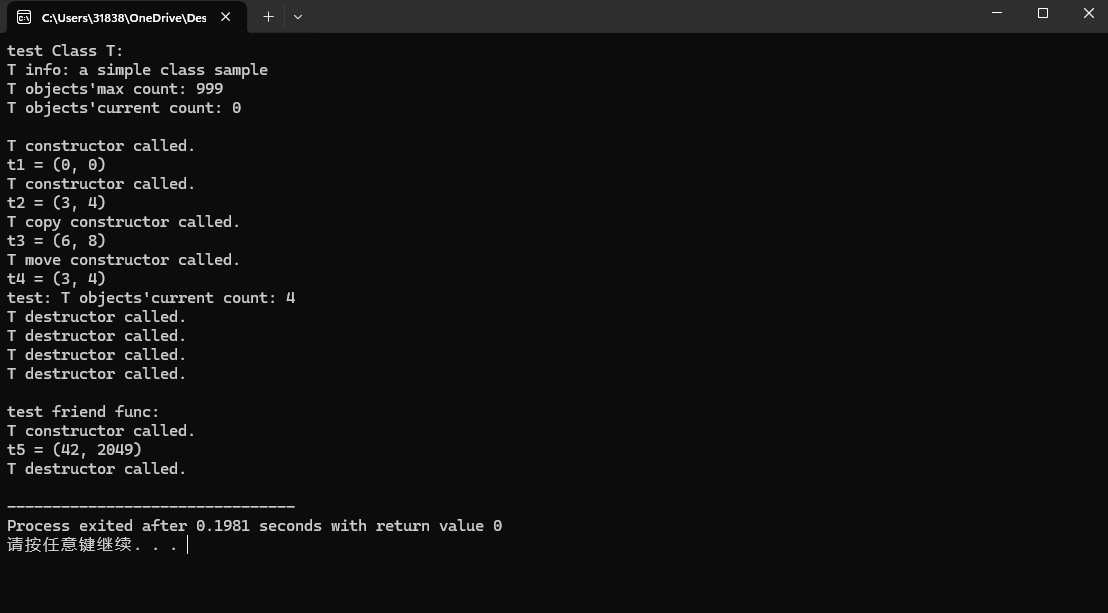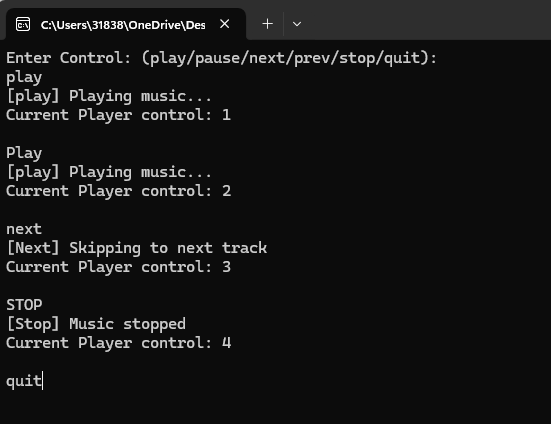实验2
实验任务1
T.h
#pragma once #include <string> // 类T: 声明 class T { // 对象属性、方法 public: T(int x = 0, int y = 0); // 普通构造函数 T(const T &t); // 复制构造函数 T(T &&t); // 移动构造函数 ~T(); // 析构函数 void adjust(int ratio); // 按系数成倍调整数据 void display() const; // 以(m1, m2)形式显示T类对象信息 private: int m1, m2; // 类属性、方法 public: static int get_cnt(); // 显示当前T类对象总数 public: static const std::string doc; // 类T的描述信息 static const int max_cnt; // 类T对象上限 private: static int cnt; // 当前T类对象数目 // 类T友元函数声明 friend void func(); }; // 普通函数声明 void func();
T.cpp
#include "T.h" #include <iostream> #include <string> // 类T实现 // static成员数据类外初始化 const std::string T::doc{"a simple class sample"}; const int T::max_cnt = 999; int T::cnt = 0; // 类方法 int T::get_cnt() { return cnt; } // 对象方法 T::T(int x, int y): m1{x}, m2{y} { ++cnt; std::cout << "T constructor called.\n"; } T::T(const T &t): m1{t.m1}, m2{t.m2} { ++cnt; std::cout << "T copy constructor called.\n"; } T::T(T &&t): m1{t.m1}, m2{t.m2} { ++cnt; std::cout << "T move constructor called.\n"; } T::~T() { --cnt; std::cout << "T destructor called.\n"; } void T::adjust(int ratio) { m1 *= ratio; m2 *= ratio; } void T::display() const { std::cout << "(" << m1 << ", " << m2 << ")" ; } // 普通函数实现 void func() { T t5(42); t5.m2 = 2049; std::cout << "t5 = "; t5.display(); std::cout << '\n'; }
Task1.cpp
#include "T.h" #include <iostream> void test_T(); int main() { std::cout << "test Class T: \n"; test_T(); std::cout << "\ntest friend func: \n"; func(); } void test_T() { using std::cout; using std::endl; cout << "T info: " << T::doc << endl; cout << "T objects'max count: " << T::max_cnt << endl; cout << "T objects'current count: " << T::get_cnt() << endl << endl; T t1; cout << "t1 = "; t1.display(); cout << endl; T t2(3, 4); cout << "t2 = "; t2.display(); cout << endl; T t3(t2); t3.adjust(2); cout << "t3 = "; t3.display(); cout << endl; T t4(std::move(t2)); cout << "t4 = "; t4.display(); cout << endl; cout << "test: T objects'current count: " << T::get_cnt() << endl; }

问题1 yes
问题2 类 T 的普通构造函数用于创建新对象并初始化其成员;复制构造函数在用已有对象创建新对象时调用,进行拷贝;移动构造函数则从临时或即将销毁的对象中“转移”资源,避免不必要的拷贝,提升效率;析构函数在对象生命周期结束时自动调用,负责清理资源。 它们共同管理着对象的创建、复制、移动和销毁。
问题3 报错,函数重复定义了
实验任务2
Complex.cpp
#include "Complex.h" #include <iostream> #include <cmath> using namespace std; const string Complex::doc = "a simplified Complex class"; Complex::Complex() : real(0.0), imag(0.0) {} Complex::Complex(double r) : real(r), imag(0.0) {} Complex::Complex(double r, double i) : real(r), imag(i) {} Complex::Complex(const Complex& other) : real(other.real), imag(other.imag) {} double Complex::get_real() const { return real; } double Complex::get_imag() const { return imag; } void Complex::add(const Complex& other) { real += other.real; imag += other.imag; } void output(const Complex& c) { cout << c.real; if (c.imag >= 0) { cout << " + " << c.imag << "i"; } else { cout << " - " << -c.imag << "i"; } } double abs(const Complex& c) { return sqrt(c.real * c.real + c.imag * c.imag); } Complex add(const Complex& c1, const Complex& c2) { return Complex(c1.real + c2.real, c1.imag + c2.imag); } bool is_equal(const Complex& c1, const Complex& c2) { return (c1.real == c2.real) && (c1.imag == c2.imag); } bool is_not_equal(const Complex& c1, const Complex& c2) { return !is_equal(c1, c2); }
Complex.h
#ifndef COMPLEX_H #define COMPLEX_H #include <string> class Complex { private: double real; double imag; public: static const std::string doc; Complex(); Complex(double r); Complex(double r, double i); Complex(const Complex& other); double get_real() const; double get_imag() const; void add(const Complex& other); friend void output(const Complex& c); friend double abs(const Complex& c); friend Complex add(const Complex& c1, const Complex& c2); friend bool is_equal(const Complex& c1, const Complex& c2); friend bool is_not_equal(const Complex& c1, const Complex& c2); }; void output(const Complex& c); double abs(const Complex& c); Complex add(const Complex& c1, const Complex& c2); bool is_equal(const Complex& c1, const Complex& c2); bool is_not_equal(const Complex& c1, const Complex& c2); #endif
task2.cpp
#include "Complex.h" #include <iostream> #include <iomanip> #include <complex> void test_Complex(); void test_std_complex(); int main() { std::cout << "*******测试1: 自定义类Complex*******\n"; test_Complex(); std::cout << "\n*******测试2: 标准库模板类complex*******\n"; test_std_complex(); } void test_Complex() { using std::cout; using std::endl; using std::boolalpha; cout << "类成员测试:" << endl; cout << Complex::doc << endl << endl; cout << "Complex对象测试:" << endl; Complex c1; Complex c2(3, -4); Complex c3(c2); Complex c4 = c2; const Complex c5(3.5); cout << "c1 = "; output(c1); cout << endl; cout << "c2 = "; output(c2); cout << endl; cout << "c3 = "; output(c3); cout << endl; cout << "c4 = "; output(c4); cout << endl; cout << "c5.real = " << c5.get_real() << ", c5.imag = " << c5.get_imag() << endl << endl; cout << "复数运算测试:" << endl; cout << "abs(c2) = " << abs(c2) << endl; c1.add(c2); cout << "c1 += c2, c1 = "; output(c1); cout << endl; cout << boolalpha; cout << "c1 == c2 : " << is_equal(c1, c2) << endl; cout << "c1 != c2 : " << is_not_equal(c1, c2) << endl; c4 = add(c2, c3); cout << "c4 = c2 + c3, c4 = "; output(c4); cout << endl; } void test_std_complex() { using std::cout; using std::endl; using std::boolalpha; cout << "std::complex<double>对象测试:" << endl; std::complex<double> c1; std::complex<double> c2(3, -4); std::complex<double> c3(c2); std::complex<double> c4 = c2; const std::complex<double> c5(3.5); cout << "c1 = " << c1 << endl; cout << "c2 = " << c2 << endl; cout << "c3 = " << c3 << endl; cout << "c4 = " << c4 << endl; cout << "c5.real = " << c5.real() << ", c5.imag = " << c5.imag() << endl << endl; cout << "复数运算测试:" << endl; cout << "abs(c2) = " << abs(c2) << endl; c1 += c2; cout << "c1 += c2, c1 = " << c1 << endl; cout << boolalpha; cout << "c1 == c2 : " << (c1 == c2) << endl; cout << "c1 != c2 : " << (c1 != c2) << endl; c4 = c2 + c3; cout << "c4 = c2 + c3, c4 = " << c4 << endl; }

问题1 Complex更简洁
问题2-1 是。因为这些函数都需要直接访问复数的实部和虚部进行计算或输出。
问题2-2 否。标准库的abs是独立函数,通过public接口real()和imag()访问数据,不需要友元。
问题2-3 只在必要时使用friend:当函数需要访问私有数据但又不能作为成员函数时,或者要支持运算符重载且需要对称性时。
实验任务3
PlayContorl.h
#pragma once #include <string> enum class ControlType {Play, Pause, Next, Prev, Stop, Unknown}; class PlayerControl { public: PlayerControl(); ControlType parse(const std::string& control_str); void execute(ControlType cmd) const; static int get_cnt(); private: static int total_cnt; };
PlayControl.cpp
#include "PlayerControl.h" #include <iostream> #include <algorithm> #include <cctype> int PlayerControl::total_cnt = 0; PlayerControl::PlayerControl() {} ControlType PlayerControl::parse(const std::string& control_str) { std::string lower_str = control_str; std::transform(lower_str.begin(), lower_str.end(), lower_str.begin(), [](unsigned char c) { return std::tolower(c); }); if (lower_str == "play") { total_cnt++; return ControlType::Play; } else if (lower_str == "pause") { total_cnt++; return ControlType::Pause; } else if (lower_str == "next") { total_cnt++; return ControlType::Next; } else if (lower_str == "prev") { total_cnt++; return ControlType::Prev; } else if (lower_str == "stop") { total_cnt++; return ControlType::Stop; } else { return ControlType::Unknown; } } void PlayerControl::execute(ControlType cmd) const { switch (cmd) { case ControlType::Play: std::cout << "[play] Playing music...\n"; break; case ControlType::Pause: std::cout << "[Pause] Music paused\n"; break; case ControlType::Next: std::cout << "[Next] Skipping to next track\n"; break; case ControlType::Prev: std::cout << "[Prev] Back to previous track\n"; break; case ControlType::Stop: std::cout << "[Stop] Music stopped\n"; break; default: std::cout << "[Error] unknown control\n"; break; } } int PlayerControl::get_cnt() { return total_cnt; }
task3.cpp
#include "PlayerControl.h" #include <iostream> void test() { PlayerControl controller; std::string control_str; std::cout << "Enter Control: (play/pause/next/prev/stop/quit):\n"; while(std::cin >> control_str) { if(control_str == "quit") break; ControlType cmd = controller.parse(control_str); controller.execute(cmd); std::cout << "Current Player control: " << PlayerControl::get_cnt() << "\n\n"; } } int main() { test(); }

实验任务4
Fraction.cpp
#include "Fraction.h" #include <iostream> #include <stdexcept> #include <cmath> using namespace std; const string Fraction::doc = "Fraction类 v 0.01版。\n目前仅支持分数对象的构造、输出、加/减/乘/除运算。"; Fraction::Fraction(int up, int down) : up(up), down(down) { if (down == 0) { throw invalid_argument("分母不能为0"); } if (down < 0) { this->up = -up; this->down = -down; } simplify(); } Fraction::Fraction(const Fraction& other) : up(other.up), down(other.down) {} int Fraction::get_up() const { return up; } int Fraction::get_down() const { return down; } Fraction Fraction::negative() const { return Fraction(-up, down); } int Fraction::gcd(int a, int b) const { a = abs(a); b = abs(b); while (b != 0) { int temp = b; b = a % b; a = temp; } return a; } void Fraction::simplify() { if (up == 0) { down = 1; return; } int common_divisor = gcd(up, down); up /= common_divisor; down /= common_divisor; } void output(const Fraction& f) { if (f.get_down() == 1) { cout << f.get_up(); } else { cout << f.get_up() << "/" << f.get_down(); } } Fraction add(const Fraction& f1, const Fraction& f2) { int new_up = f1.get_up() * f2.get_down() + f2.get_up() * f1.get_down(); int new_down = f1.get_down() * f2.get_down(); return Fraction(new_up, new_down); } Fraction sub(const Fraction& f1, const Fraction& f2) { int new_up = f1.get_up() * f2.get_down() - f2.get_up() * f1.get_down(); int new_down = f1.get_down() * f2.get_down(); return Fraction(new_up, new_down); } Fraction mul(const Fraction& f1, const Fraction& f2) { int new_up = f1.get_up() * f2.get_up(); int new_down = f1.get_down() * f2.get_down(); return Fraction(new_up, new_down); } Fraction div(const Fraction& f1, const Fraction& f2) { if (f2.get_up() == 0) { throw invalid_argument("分母不能为0"); } int new_up = f1.get_up() * f2.get_down(); int new_down = f1.get_down() * f2.get_up(); return Fraction(new_up, new_down); }
Fraction.h
#pragma once #include <string> class Fraction { public: static const std::string doc; Fraction(int up = 0, int down = 1); Fraction(const Fraction& other); int get_up() const; int get_down() const; Fraction negative() const; private: int up; int down; void simplify(); int gcd(int a, int b) const; }; void output(const Fraction& f); Fraction add(const Fraction& f1, const Fraction& f2); Fraction sub(const Fraction& f1, const Fraction& f2); Fraction mul(const Fraction& f1, const Fraction& f2); Fraction div(const Fraction& f1, const Fraction& f2);
task4.cpp
#include "Fraction.h" #include <iostream> void test1(); void test2(); int main() { std::cout << "测试1: Fraction类基础功能测试\n"; test1(); std::cout << "\n测试2: 分母为0测试: \n"; test2(); } void test1() { using std::cout; using std::endl; cout << "Fraction类测试: " << endl; cout << Fraction::doc << endl << endl; Fraction f1(5); Fraction f2(3, -4), f3(-18, 12); Fraction f4(f3); cout << "f1 = "; output(f1); cout << endl; cout << "f2 = "; output(f2); cout << endl; cout << "f3 = "; output(f3); cout << endl; cout << "f4 = "; output(f4); cout << endl; const Fraction f5(f4.negative()); cout << "f5 = "; output(f5); cout << endl; cout << "f5.get_up() = " << f5.get_up() << ", f5.get_down() = " << f5.get_down() << endl; cout << "f1 + f2 = "; output(add(f1, f2)); cout << endl; cout << "f1 - f2 = "; output(sub(f1, f2)); cout << endl; cout << "f1 * f2 = "; output(mul(f1, f2)); cout << endl; cout << "f1 / f2 = "; output(div(f1, f2)); cout << endl; cout << "f4 + f5 = "; output(add(f4, f5)); cout << endl; } void test2() { using std::cout; using std::endl; Fraction f6(42, 55), f7(0, 3); cout << "f6 = "; output(f6); cout << endl; cout << "f7 = "; output(f7); cout << endl; cout << "f6 / f7 = "; output(div(f6, f7)); cout << endl; }

自由函数 设计简洁




 浙公网安备 33010602011771号
浙公网安备 33010602011771号